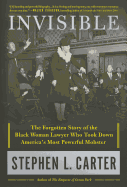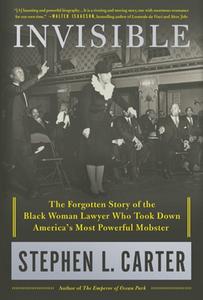
 Few people know that a black female lawyer, Eunice Hunton Carter, was a vital part of the team that took down notorious New York mobster Lucky Luciano in the 1930s. Fewer still know her remarkable life story. The granddaughter of slaves and a graduate of Smith College, Eunice was whip-smart, ambitious and determined to rise above the expectations for black women of her day and time. Her grandson, author and law professor Stephen L. Carter, paints a detailed portrait of his formidable Nana in the insightful biography, Invisible.
Few people know that a black female lawyer, Eunice Hunton Carter, was a vital part of the team that took down notorious New York mobster Lucky Luciano in the 1930s. Fewer still know her remarkable life story. The granddaughter of slaves and a graduate of Smith College, Eunice was whip-smart, ambitious and determined to rise above the expectations for black women of her day and time. Her grandson, author and law professor Stephen L. Carter, paints a detailed portrait of his formidable Nana in the insightful biography, Invisible.Carter (The Emperor of Ocean Park; New England White) begins with the story of Eunice's parents, William and Addie, both prominent activists who moved from Atlanta to Brooklyn after the 1906 race riots. After William's death, Addie became increasingly dedicated to her work, spending many years on the lecture circuit. (Carter later notes the ways in which Eunice repeated this pattern with her son.)
After graduating from Smith and earning a law degree from Fordham, Eunice began practicing law in New York City and even ran for state office as a Republican candidate. But her career took off when she began working for Special Prosecutor Thomas E. Dewey, the future Governor and presidential candidate who was determined to tackle organized crime in the city. Eunice, the only woman and the only black person on Dewey's team, provided essential information and strategy that led to Luciano's conviction. Despite her contributions, Eunice was repeatedly passed over for promotions, but she never gave up, continuing to juggle multiple roles as a lawyer, an activist, a politician and a noted Harlem hostess.
Carter's narrative reads at times like a legal thriller, as he traces the ins and outs of the case against Luciano and other high-profile cases Eunice later handled. This is not merely a courtroom account, though: it is the story of the life of a complicated woman, and Carter does his best to depict his grandmother with compassion and clarity. He analyzes the forces of systemic racism and sexism that plagued her at every turn, while giving an inside glimpse into the workings of "sassiety" (the upper echelons of Harlem society) in the early 20th century. The later chapters focus increasingly on complex family dynamics, especially Eunice's troubled relationship with her only brother, Alphaeus, who would be imprisoned in the 1950s for his communist activities.
Meticulously researched and compelling, Invisible is at once a fascinating slice of New York legal and racial history and a thoughtful portrayal of a woman who refused to be hidden. --Katie Noah Gibson, blogger at Cakes, Tea and Dreams
Shelf Talker: Stephen Carter tells the life story of his grandmother, the black female lawyer who helped take down notorious mobster Lucky Luciano.

